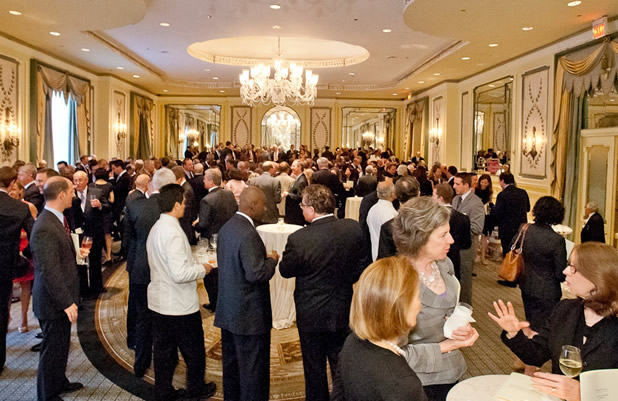FPA Membership Network

Network: Becoming an FPA member gives you access to a network of foreign policy experts and key public officials.
FPA invites members to attend some 40 annual conferences, panel discussions, lectures, film screenings, and dinner meetings in the New York area. At these events, members have the chance to meet with professionals, experts, and business people who are concerned with foreign policy.
At FPA events, the public and public officials gather for an open discussion to expand awareness, understanding, and informed opinion on global issues and U.S. foreign policy challenges.
Member ($350)
Admission and guest passes to Membership events.
Subscriptions to selected Foreign Policy Association publications.
Discounted admission to selected events and programs.
Sponsoring Members ($750)
All of the above benefits, plus:
Discounted admission to the annual FPA Leadership Forum.
Invitation and Member discount to the FPA Annual Dinner.
Patron ($1,500)
All of the above benefits, plus:
Admission to select FPA Fellows’ events.
Invitation and Member discount to the annual FPA Financial Services Dinner.
Some of FPA’s most memorable events include:
James McDonald Lecture on Humanitarian Intervention: The Chemical Weapons Issue in Syria—An Insider’s Perspective on the International Response
Ms. Angela Kane, U.N. High Representative for Disarmament Affairs, spoke on the U.N. effort to eradicate chemical weapons from Syria after multiple reported attacks throughout the year.
Andrew Carnegie Distinguished Lecture on Conflict Prevention with David A. Hamburg
Mr. David Hamburg, President Emeritus of the Carnegie Corporation of New York, gave a lecture on how to prevent large-scale violence across the world. In his speech, he challenged the U.N. and other world peacekeeping organizations to continue to look for new solutions to conflicts that arise.
World Leadership Forum Keynote address
Ambassador Ashok Kumar Mirpuri, Singapore’s Ambassador to the U.S., discussed Singapore’s relationship with the U.S. as the two nations continue to build partnerships and trade. He also gave an update for the outlook and future of Southeast Asia as a whole.
The Intervention Calculation, Screening and Panel Discussion
Colum Lynch and Jonathan Tepperman, both foreign policy writers and editors, spoke with moderator MacDara King about the considerations nations must take when deciding to intervene in a foreign conflict. By looking at past interventions from the U.S. and others, they talked about what the conditions would be for a nation to intervene in the future.






